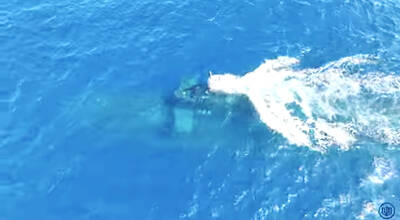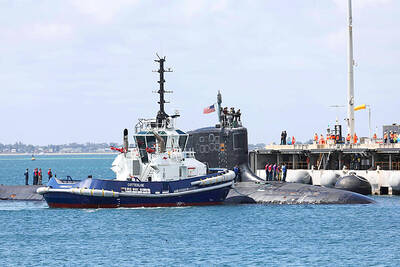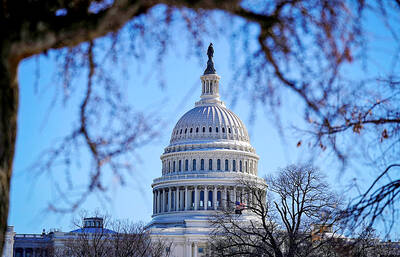North Korea said yesterday it has stopped disabling its nuclear plants and would consider restoring them because the US has not removed it from a terrorism blacklist.
A foreign ministry spokesman said that because the US was not honoring a disarmament deal, work to make the plants unusable had halted on Aug. 14.
“Secondly, we will consider restoring the Yongbyon facilities to their original state in accordance with strong demands from our relevant agencies,” he said.
The US says the North must accept strict procedures to verify the declaration it made in June of its nuclear activities before it can be taken off the blacklist, which blocks US economic aid. The North rejected the demand.
“It would be a big mistake if the US believes that it can carry out a search of our home as it pleases, just as it did in Iraq,” the spokesman said in a statement carried by the official Korean Central News Agency.
The dispute means that a six-party process that began in August 2003 “will inevitably stay off track for the time being,” said Yang Moo-jin, professor at Seoul’s University of North Korean Studies.
“North Korean leader Kim Jong-il seems to have make a strategic decision that he will no longer continue negotiations with the Bush administration,” Yang said.
The North’s statement questioned the value of the talks, which group the two Koreas, the US, China, Russia and Japan.
“When the six-party talks has [sic] degenerated into a circus where the strong bullies the weak as it pleases, what’s the use of the six-party structure?” it asked.
The North tested an atomic weapon in 2006, but then agreed to return to the talks. Under deals reached last year, it began disabling the reactor and other plants under US supervision.

CSBC Corp, Taiwan (台灣國際造船) yesterday released the first video documenting the submerged sea trials of Taiwan’s indigenous defense submarine prototype, the Hai Kun (海鯤), or Narwhal, showing underwater navigation and the launch of countermeasures. The footage shows the vessel’s first dive, steering and control system tests, and the raising and lowering of the periscope and antenna masts. It offered a rare look at the progress in the submarine’s sea acceptance tests. The Hai Kun carried out its first shallow-water diving trial late last month and has since completed four submerged tests, CSBC said. The newly released video compiles images recorded from Jan. 29 to

DETERRENCE EFFORTS: Washington and partners hope demonstrations of force would convince Beijing that military action against Taiwan would carry high costs The US is considering using HMAS Stirling in Western Australia as a forward base to strengthen its naval posture in a potential conflict with China, particularly over Taiwan, the Wall Street Journal reported on Saturday. As part of its Indo-Pacific strategy, Washington plans to deploy up to four nuclear-powered submarines at Stirling starting in 2027, providing a base near potential hot spots such as Taiwan and the South China Sea. The move also aims to enhance military integration with Pacific allies under the Australia-UK-US trilateral security partnership, the report said. Currently, US submarines operate from Guam, but the island could

RESTRAINTS: Should China’s actions pose any threat to Taiwan’s security, economic or social systems, China would be excluded from major financial institutions, the bill says The US House of Representatives on Monday passed the PROTECT Taiwan Act, which states that Washington would exclude China from participating in major global financial organizations if its actions directly threaten Taiwan’s security. The bill, proposed by Republican Representative Frank Lucas, passed with 395 votes in favor and two against. It stipulates that if China’s actions pose any threat to Taiwan’s security, economic or social systems, the US would, “to the maximum extent practicable,” exclude Beijing from international financial institutions, including the G20, the Bank for International Settlements and the Financial Stability Board. The bill makes it clear that China must be prepared

Taiwanese trade negotiators told Washington that Taipei would not relocate 40 percent of its semiconductor production to the US, and that its most advanced technologies would remain in the nation, Vice Premier Cheng Li-chiun (鄭麗君) said on Sunday. “I told the US side very clearly — that’s impossible,” Cheng, who led the negotiation team, said in an interview that aired on Sunday night on Chinese Television System. Cheng was referring to remarks last month by US Secretary of Commerce Howard Lutnick, in which he said his goal was to bring 40 percent of Taiwan’s chip supply chain to the US Taiwan’s almost